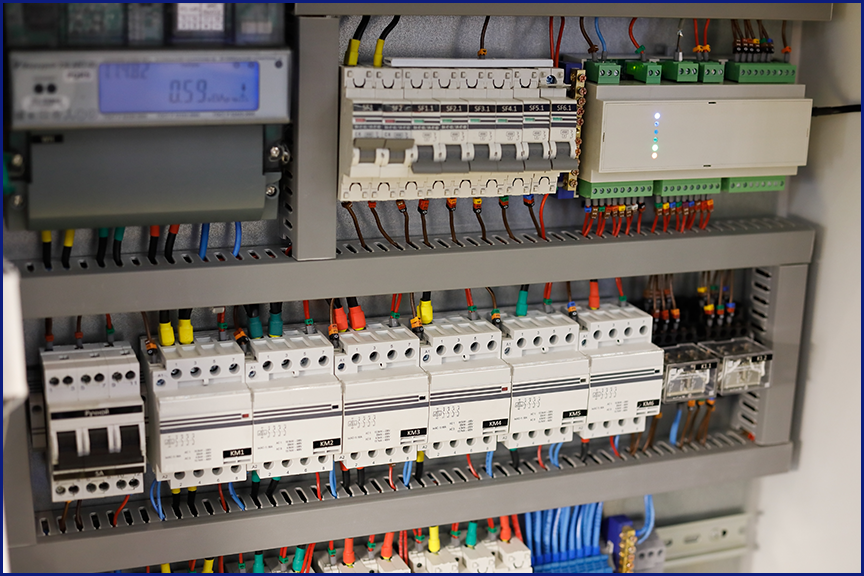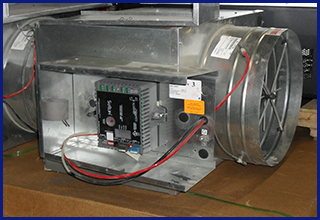Building Automation Systems Program
Categories
- View all Products
- Core Courses
- Add-Ons / Misc
- Air Conditioning
- Air Distribution
- Apprenticeship
- Building Automation
- Certification Programs
- Comm.- Refrigeration
- Electrical
- Heat
- Home Performance
- Light Commercial
- OSHA Safety
- Quality Installation
- Reviews
- Soft Skills
- Spanish
- Subscription Program
- Tech.- Core Assessment
- Water Treatment
 |
Building Automation Systems Program - (Courses 153, 154, 155, 156, 157, 158,159, 422) 150 Total instructional hours - 365 days to complete Written by Ron Auvil (Includes textbooks - HVAC Control Systems Textbook and Workbook - a $160 value) The online building automation training program discusses electric and electronic control systems used in commercial HVAC systems. Building Automation Systems (BAS) are discussed in detail,starting with older systems and proceeding to today’s modern web-based systems. The student learns the types and methods of operator interfaces in commercial buildings, as well as the different types of BAS inputs and outputs in detail. Moving on, students learn the skills and in-depth understanding needed to install and program typical modern BAS equipment. Instruction is carried out in a vendor-independent manner. VAV terminal box, Air Handling Unit, and Central Boiler/Chiller Plant Programming will be used as examples. Moving further on, HVAC Technicians and others involved in the HVAC, industry learn BAS advanced implementation strategies regarding energy saving features. This HVAC/R Building Automation Systems (BAS) online training program also equips the technician to perform basic service troubleshooting of BAS and understand the role and structure of interoperable systems including BACNET and LON. The student will then be able to work with commissioning agents to ensure proper BAS operation and implementation. A series of recorded video lecture presentations included with each learning module are covered in detail in a ‘ride-along in the service van’ format. All scenarios are derived from actual service calls. Upon completion of this HVAC/R Building Automation Systems (BAS) online training program, the technician will have covered a minimum 70% of the most frequent service calls on BAS/DDC. Upon completion of this program the student will be prepared for the HVAC Excellence Employment Ready Building Automation Technician Certification exam. This 100-question exam covers: DDC Fundamentals, Building Automation Networks, Building Automation Controllers, Digital Logic and Programming, Sensor Installation and Applications, Actuator Installation and Applications. Review the exam competency and task list here: HVAC Excellence Competency & Task List for Building Automation Certification The courses making up the Program are:
Required Textbooks: HVAC Control Systems (4th edition) and Workbook shipped upon program enrollment, included with Program Enrollment. For course descriptions, find the corresponding course number earlier in this catalog. Prerequisites: This program is designed for HVAC technicians, facilities managers, and commercial maintenance technicians who have already completed an educational program for HVAC and/or have current industry work experience in the field. The program will build on your existing knowledge of HVAC fundamentals and equipment and help you learn HVACR Controls and Building Automation Systems. Grades: Students who complete a course with a grade of 70% or higher will receive a certificate of completion for that course. Further, at the end of the program, if all six courses are passed with a score of 70% or higher, students will receive a Certificate of Completion for the HVAC Controls / Building Automation Systems Program. Jobs: A quick check revealed that Indeed.com shows 1,044 job listings for Building Automation Controls Technician; Monster.com shows over 1,000, Career Builder shows 504, and GlassDoor.com shows 4,457. This skill set is much in demand right now and will continue to increase! This program qualifies for our no-interest in-house financing. Course Descriptions: 422 DDC Bootcamp (18 instructional hours) Written by Ron Auvil The vast majority of commercial buildings today utilize Direct Digital Control (DDC) systems. Any technician working in a commercial building must have a basic understanding of these systems. Technicians choosing a career path in controls must have an even greater understanding of these systems. This six module series is designed for new hires and those transitioning from residential systems to commercial building HVAC and control systems. Direct Digital Control system types and configurations are presented and discussed. The course is generic and not focused on one manufacturer or type. Emphasis is put on real-world troubleshooting and operation scenarios. It will cover common commercial HVAC systems and multiple generations of controls. Students will take one course/module at a time in a systematic progression. Students are enrolled as online asynchronous. This access allows students to login at their convenience 24/7/365. The modules making up the course are:
153 HVACR Control Systems Fundamentals (18 Instructional Hours) Intermediate Written by Ron Auvil This course is designed to introduce HVACR Technicians, and others involved in the HVACR industry, to the Fundamentals of HVACR Control Systems. This course will prepare students with a strong understanding of typical HVAC mechanical systems in a commercial building environment. In turn, the student will gain an understanding of the different types of control systems and concepts used in these commercial buildings. Instruction aligns with ACCA Quality Installation & Maintenance Standards. Recommended Prerequisites: you will need a strong working knowledge of HVACR Fundamentals prior to enrollment into this course. The main topics for the course are identified below:
154 HVACR Control System Types and BAS Basics (18 Instructional Hours) Intermediate Written by Ron Auvil This course is designed to introduce HVACR Technicians, and others involved in the HVACR industry, to Electrical and electronic control systems as used in commercial buildings and HVAC systems. Building Automation systems will then be discussed in detail, starting with older systems and proceeding to today’s modern web-based systems. The student will understand types and methods of operator interfaces in commercial buildings, as well as the different types of BAS inputs and outputs in detail. Instruction aligns with ACCA Quality Installation & Maintenance Standards. Recommended Prerequisites: you will need a strong working knowledge of HVACR Fundamentals and completion of “153 Controls Systems Fundamentals” prior to enrollment into this course. The main topics for the course are:
155 HVACR BAS Installation and Strategies (18 Instructional Hours) Advanced Written by Ron Auvil This course is designed to equip HVACR Technicians, and others involved in the HVACR industry, with the skills and understanding needed to install and program typical modern BAS equipment. This will be done in a vendor-independent manner. VAV terminal box, Air Handling Unit, and Central Boiler/Chiller Plant Programming will be used as examples. Instruction aligns with ACCA Quality Installation & Maintenance Standards. Recommended Prerequisites: completion of 153 Controls Systems Fundamentals, and 154 Control Systems Types and BAS Basics prior to enrollment into this advanced course. The main topics for the course are identified below:
156 HVACR BAS System Management and Advanced Technologies (15 Instructional Hours) Advanced Written by Ron Auvil This course is designed to equip HVACR Technicians, and others involved in the HVACR industry, with the knowledge needed to implement advanced strategies in BAS regarding alarms trends and energy saving features. This course will also equip the technician to perform basic service troubleshooting of BAS and understand the role and structure of interoperable systems including BACNET and LON. The student will then be able to work with commissioning agents to ensure proper BAS operation and implementation. Instruction aligns with ACCA Quality Installation & Maintenance Standards. Recommended Prerequisites: completion of 153 Controls Systems Fundamentals, and 154 Control Systems Types and BAS Basics, and 155 BAS Installation and Strategies prior to enrollment into this advanced course. The main topics for the course are identified below:
157 Troubleshooting DDC Systems & Components Course (21 hours/ 60 days) Advanced Written by Ron Auvil Tap into the experience of a Pro! This class is designed for advanced level technicians who want to learn and enhance their BAS/DDC Troubleshooting skills. Dozens of In-depth multiple field troubleshooting scenarios are covered in detail in a ‘ride-along in the service van’ format. All scenarios are derived from actual service calls. Upon completion of this course the technician will have covered a minimum 75% of the most common service calls on BAS/DDC. Videos and hands-on access to a control system will be used to enhance the learning experience as well! Prerequisite: Successful completion of BAS Program 153-156 or Equivalent Field experience. The modules are identified below:
158 HVACR Troubleshooting Variable Air Volume (VAV) Systems (21 Instructional hours / 365 days to complete) Advanced Written By - Ron Auvil Variable Air Volume (VAV) Systems are the most common type of large commercial HVAC System in use today. This course is designed for advanced level technicians and building maintenance personnel who are responsible for troubleshooting these Variable Air Volume (VAV) systems. This course will start with an in-depth overview of the history and types of VAV systems. Next up is a list of common needed troubleshooting tools. Control system components and layouts to include pneumatic and DDC are given. VAV air handling units and sequences of operation of all major types are covered in depth. The most common troubleshooting scenarios of VAV air handling units are described as well. The vast majority of VAV terminal Box types are thoroughly covered, as well as components and control sequences. The course will finish up with and in-depth multiple field troubleshooting scenarios which are represented in detail. All scenarios are derived from actual service calls. Upon completion of this course the technician will have been exposed to a minimum 75% of the most common service calls on VAV systems. Prerequisite: Successful completion of BAS Program 153-157 or Equivalent Field experience. No textbook is needed or used. Will be using field manual pdf’s from various vendors. Actual Job Prints will be used as needed. The seven modules in this course are:
159 - HVACR IT for HVAC Technicians (21 hours/ 60 days) Advanced Written by Ron Auvil This course will prepare both HVAC and Controls Technicians to work on today’s modern web-based systems in a commercial HVAC Control System. This course will provide technicians with an introduction to Ethernet networking concepts, hardware, configuration, and troubleshooting. This course is aimed at HVAC technicians servicing automated control systems that are based on networked controllers. We will cover the basic operation of an Ethernet-based network, servers, and software tools. We’ll follow that with examples of the 19 most common causes of network problems, including their symptoms, diagnosis, and remedies. Professional relationships and collaboration with facility IT staff is emphasized throughout. Prerequisite: Successful completion of BAS Program 153-156 or Equivalent Field experience. Required Text: HVAC Control Systems’ and Workbook by Ronnie J Auvil 4th Edition. Textbooks will be shipped to the student.
Textbook Reference: https://www.hvacrassets.net/Textbook/TextbookPage081021.pdf |


